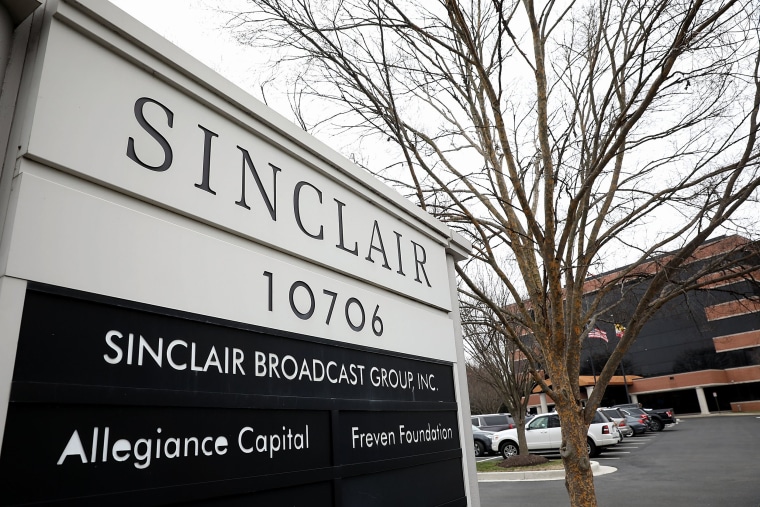Tribune Media has filed a lawsuit against Sinclair Broadcast Group over their failed merger and is seeking $1 billion in damages.
Tribune bailed out of the long-pending sale agreement on Thursday in the face of opposition from the FCC and questions about whether Sinclair tried to mislead the government with its divestiture plan, in which it sought to sell some stations to parties close to Sinclair.
Tribune cited Sinclair's "unnecessarily aggressive and protracted negotiations with the Department of Justice and the Federal Communications Commission" in the regulatory review of the merger as the reason for the suit, filed Thursday in Delaware Chancery Court.
"In light of the FCC's unanimous decision, referring the issue of Sinclair's conduct for a hearing before an administrative law judge, our merger cannot be completed within an acceptable timeframe, if ever," said Peter Kern, Tribune Media CEO. "This uncertainty and delay would be detrimental to our company and our shareholders. Accordingly, we have exercised our right to terminate the Merger Agreement, and, by way of our lawsuit, intend to hold Sinclair accountable."
The $3.9 billion transaction, set in May 2017, would have combined two of the country's largest broadcasters into a giant with more than 200 stations. Public interest groups lined up against the merger and Democrats contended that Sinclair was trying to infuse local stations with a conservative bent.
The decision to abandon the merger immediately raises the prospect of other suitors for Tribune Media. Industry sources speculate that the company may wind up selling off its assets in piecemeal fashion. Fox Television Stations had already cut a deal with Sinclair to acquire 7 of Tribune's Fox affiliate stations for $910 million as part of its divestiture plan.
The deal-breaker on the merger came last month, when FCC chairman Ajit Pai announced that he had "serious concerns" about the transaction. The commissioners voted unanimously to send the merger to an administrative law judge for a hearing, a prospect that likely would add months or a year or longer to the review.
Tribune asserted Thursday that Sinclair violated the terms of the agreement that called for Sinclair to make a good-faith effort to comply with regulatory requirements to close the deal as quickly as possible.
"Sinclair's entire course of conduct has been in blatant violation of the Merger Agreement and, but for Sinclair's actions, the transaction could have closed long ago," Tribune said.
The FCC claimed that Sinclair engaged in "a potential element of misrepresentation or lack of candor" in its effort to secure government approval. That centered on the way that Sinclair laid out its plans to divest certain stations, a necessity if it was to comply with media ownership limits.
Among other things, the FCC zeroed in on the business ties between Smith and businessman Steven Fader in connection with the plan to sell Tribune's WGN-TV Chicago to a new entity controlled by Fader for $60 million. That plan sparked concern from merger opponents because the purchase price was so far below fair market value for a Chicago TV station. Fader is CEO of Atlantic Automotive Group, in which Smith has an equity interest and also sits on its board. The commission's order noted that Fader had no prior broadcast TV experience, and the transaction was structured as to give Sinclair sway over the station's operations.
Sinclair denied that it misrepresented the facts in its merger filings.
Sinclair's ties to President Donald Trump had been an issue throughout the regulatory process, and Trump publicly expressed his unhappiness at the FCC for failing to approve it. He called it "sad and unfair," and added, "This would have been a great and much needed Conservative voice for and of the People. Liberal Fake News NBC and Comcast gets approved, much bigger, but not Sinclair. Disgraceful!"
One of Trump's former communications spokespersons, Boris Epshteyn, is chief political analyst at Sinclair.
Pai, who Trump appointed as FCC chair, told a congressional hearing that he stood by the decision, and last week he said that he has not had any contact with the White House following the president's tweet.
The merger was first inked in May 2017, and the transaction almost immediately became a focus of a lobbying battle in D.C. As Sinclair defended the transaction as necessary consolidation in the face of competition from cable and tech, opponents waged social media campaigns. Some other conservative news outlets, like Newsmax, The Blaze and One America News Network, publicly opposed the transaction.
Claire Atkinson contributed reporting.

